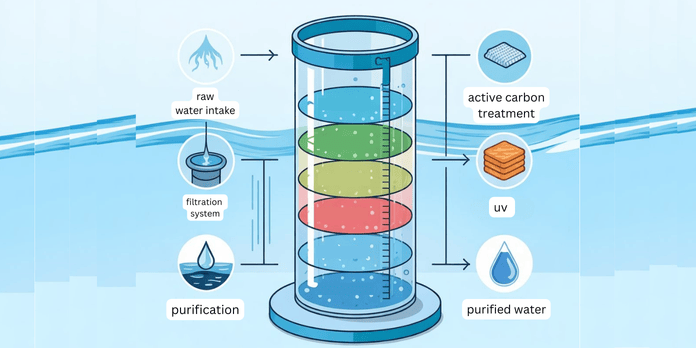Whether in a Mineral Water Plant or a large-scale wastewater treatment plant in Ahmedabad, the purification process typically involves the following stages:
1. Intake and Screening
The process begins with collecting raw water from sources like rivers, lakes, or underground borewells. The water first passes through screens to remove large debris like leaves, plastic, and branches.
Purpose:
To prevent clogging and damage to pumps and pipes in the next stages.
2. Coagulation and Flocculation
In this step, chemicals called coagulants (like alum) are added to the water. These chemicals cause small dirt and impurity particles to stick together, forming larger clumps called flocs.
Purpose:
To bind tiny suspended particles into larger, easily removable ones.
3. Sedimentation
The water then moves to a sedimentation tank where the heavy flocs slowly settle to the bottom by gravity. The cleaner water stays on top.
Purpose:
To separate the majority of solid impurities from the water.
4. Filtration
Next, the partially cleaned water is passed through layers of sand, gravel, and sometimes activated carbon. These filters trap smaller particles, bacteria, and even bad odors or tastes.
Purpose:
To remove remaining impurities and microorganisms.
This step is especially critical in water filtration plant manufacturers in Ahmedabad, where fine-tuned filtration systems are designed for maximum efficiency.
5. Disinfection
To kill any remaining bacteria, viruses, or pathogens, disinfectants like chlorine, ozone, or UV light are used.
Purpose:
To ensure the water is microbiologically safe for drinking.
At this point, the water is usually considered safe for domestic or commercial use, especially in mineral water plants that package it for retail sale.
6. Mineral Addition (Optional in Mineral Water Plants)
In the case of bottled mineral water, minerals like calcium and magnesium are added back into the purified water to improve taste and health benefits.
Purpose:
To make the water not just safe, but also beneficial for health and palatable.
7. pH Adjustment
If the water is too acidic or too alkaline, its pH is adjusted using chemicals to bring it to a neutral or slightly alkaline level, suitable for drinking or industrial processes.
8. Storage and Distribution
The final purified water is stored in clean tanks. From here, it is either bottled (in the case of Mineral Water Plants) or distributed via pipelines to households and industries.
What Happens in a Wastewater Treatment Plant?
While drinking water plants purify fresh water, wastewater treatment plants in Ahmedabad clean used water from homes, factories, and sewage systems. These plants follow a similar multi-step process:
- Primary treatment: Removal of solid waste
- Secondary treatment: Biological treatment using microbes
- Tertiary treatment: Advanced filtration and disinfection
Once treated, the water can be safely released back into nature or reused for irrigation, industrial cooling, or toilet flushing.
Role of Water Treatment Plant Manufacturers in Ahmedabad and India
Thanks to rapid urban development, the demand for water treatment plant manufacturers in Ahmedabad and across India is growing quickly. These manufacturers play a critical role in:
- Designing customized water and wastewater solutions
- Installing modern filtration and RO systems
- Maintaining treatment plants for industries, municipalities, and housing societies
- Offering sustainable and energy-efficient purification systems
Many water filtration plant manufacturers in Ahmedabad are also exporting their technology and equipment to other states and countries.
Benefits of Modern Water Treatment Plants
Whether it’s a compact Mineral Water Plant or a full-scale industrial wastewater treatment unit, modern water purification systems offer several benefits:
- High water recovery rate
- Energy efficiency
- Automated and low-maintenance
- Long-lasting and scalable
- Environmental sustainability
This is why companies, housing societies, hospitals, and municipalities trust the expertise of water treatment plant manufacturers in India to implement reliable and cost-effective purification systems.
Common Technologies Used in Water Purification
Today’s purification systems rely on a mix of traditional and advanced technologies:
- Reverse Osmosis (RO) – Removes salts and heavy metals
- Ultraviolet (UV) Disinfection – Destroys harmful microbes
- Activated Carbon Filters – Absorbs chemicals and odors
- Membrane Filtration – For fine-particle and bacteria removal
- Ion Exchange Systems – For softening and deionizing water
Each method is selected based on the quality of raw water and intended use.
FAQs – Water Purification Process
1. What’s the difference between water treatment and water purification?
Water treatment is a broader term that includes processes for both drinking water and wastewater. Water purification focuses more on making water safe and clean for consumption.
2. How much does a Mineral Water Plant cost?
The mineral water plant setup cost can vary based on capacity and equipment used. A small-scale setup may start around ₹5-10 lakhs, while larger, automated plants can go beyond ₹50 lakhs.
3. Can wastewater be reused after purification?
Yes, treated wastewater can be reused for gardening, industrial cooling, and even toilet flushing—helping save fresh water.
4. How to choose the right water treatment plant manufacturer?
Look for certified water treatment plant manufacturers in Ahmedabad with good reviews, technical expertise, after-sales service, and experience in handling projects similar to yours.
Final Thoughts
The water purification process is a complex but vital journey that transforms contaminated water into a life-sustaining resource. Whether it’s for bottled drinking water or treated wastewater, reliable purification ensures public health, environmental protection, and long-term sustainability.
Thanks to advanced systems from trusted water treatment plant manufacturers in India, especially in innovation hubs like Ahmedabad, access to clean water is becoming more affordable and widespread.
Thinking of setting up a Mineral Water Plant or a treatment unit for your factory or society? Connect with a leading water filtration plant manufacturer in Ahmedabad today and take the first step toward pure, safe, and sustainable water solutions.

